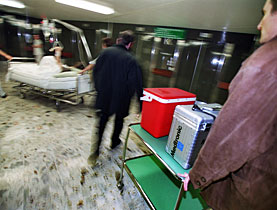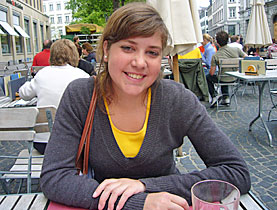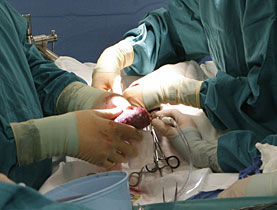Organ donors reach “alarmingly low” levels

Switzerland is the second-worst country in Europe for organ donation, according to Swisstransplant, the country's organ donation and transplantation foundation.
Sixty-two people died in 2008 because a suitable organ could not be found – 12 more than in 2007 – and 1,544 patients were sitting on waiting lists, up from 1,381 in 2007.
“There’s been a slight increase for the first time in the number of donors but it’s still only Greece which is behind us,” Swisstransplant director Franz Immer told swissinfo.
Figures released at the annual meeting of the Swiss transplantation society in Interlaken revealed that the number of people who donated organs after their death rose last year by 12.5 per cent to 90. The number of people donating organs while alive rose by 14.3 per cent to 128.
But despite this increase, Immer said Switzerland was once again bringing up the rear in Europe with only 11.8 organ donors per million inhabitants. Compared with neighbouring countries, he said this figure should be almost twice as high.
Immer added that such a situation in a country like Switzerland was unacceptable.
“Our knowledge of transplantation surgery and medical treatment is world-class,” he said. “What’s missing are the desperately needed organs.”
The main organs transplanted are kidneys, livers, lungs and hearts. However, hands, entire arms, corneas, bones and skin are also in demand.
Asymmetry
Immer cited several reasons for Switzerland’s poor performance. “The hospitals have a big workload and not all of them are actively involved in recruiting donors. Also, in some regions there’s a very high refusal rate when approaching the next of kin,” he said.
“If you look across Switzerland, there is a slight asymmetry. We have some regions that perform very well and others which are very low in recruiting donors.”
He denied that Switzerland’s relatively conservative nature and religiosity played a role.
“We found no relation to religious aspects. I think it’s mainly related to some issues brought up in transplantation or discussed in the press which adversely affect the acceptance of family members.”
Solutions
As for improving the situation, Immer said an “important step” had been taken in the integration of intensive care workers into Swisstransplant.
“The project is financed by the cantons and I think that’s a very important approach – to sit together and find ways of finding donors all over Switzerland,” he said.
“That’s an important step in finding those potential donors which could allow us to maybe even increase the number of donors to 150.”
Immer said the concept of “presumed consent”, in which it is assumed organs can be used unless the person has opted out, had been rejected in Switzerland.
“It was discussed in great detail and rejected by virtually all politicians. Even if you have the agreement [of the donor], you will still ask the family if they agree on the donation. In Switzerland we won’t insist if family members refuse,” he said.
“Creating negative publicity by forcing family members to approve organ donation is not the right way to increase the number of donations.”
Campaigns
The figures released showed that although the number of donors aged over 65 continued to rise, those under 30 had significantly dropped.
To fix this, Swisstransplant is planning to launch various campaigns throughout the year to increase awareness about organ donation among the public.
“We will also try to increase the impact on the hospitals by implementing educational programmes for intensive care workers or anaesthetists,” Immer said.
“Transplantation significantly increases the quality of life of the recipients.”
swissinfo, Thomas Stephens
The transplant law of July 1, 2007 established a centralised system for organ transplants.
Under the new law, the waiting list is also handled centrally. Allocation is done by computer, taking into account the urgency of the case, the benefit to the patient, and the length of time on the waiting list.
It is forbidden to buy or sell organs.
Organs can only been removed if the donor has agreed, for example by carrying a donor card. Otherwise next-of-kin must give permission.
The Federal Health Office estimates that 15% of the population carry a card.
At the end of 2007 there were 870 names on the waiting list for organs.
In 2007, 437 organs were transplanted in Switzerland.

In compliance with the JTI standards
More: SWI swissinfo.ch certified by the Journalism Trust Initiative













You can find an overview of ongoing debates with our journalists here . Please join us!
If you want to start a conversation about a topic raised in this article or want to report factual errors, email us at english@swissinfo.ch.